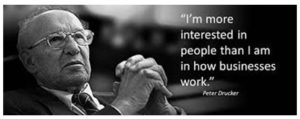It’s the holiday season and I’ve been working in my office clearing things out to make room for new ideas and new things. I spent all day Saturday emptying old filing cabinets and throwing away reams of old client files. We don’t store paper anymore; we scan everything and save it digitally.
I did come across some wonderful memories from the 500 or so home care agencies I’ve worked with over the past three decades. And I came across some interesting articles. One in particular was by Peter Drucker. I met the management guru once in an elevator after speaking at a national conference.
His article, published in the Marriott Hotels magazine, Fall 1986, was entitled “How to Hire Winners.” Here are some key points:
- Executives spend more time on managing people and making people decisions than on anything else.
- No other decisions are so long lasting in their consequences or so difficult to unmake.
- By and large, executives make poor promotion and staffing decisions. In no other area of management would we put up with such miserable performance.
Then Drucker goes on to share some principles in making people decisions:
- If you put a person into a job and he or she does not perform, you have made a mistake. You have no business blaming that person.
- It is the duty of managers to make sure the responsible people in their organization perform.
- Of all of the decisions an executive makes, none are as important as the decisions about people because they determine the performance capacity of the organization. Therefore, I better make these decisions well.
Drucker’s Five Step Process for Hiring Winners
- Think Through The Assignment – each time you fill an assignment the elements of the job change.
- Look at a Number of Potentially Qualified People – The person and the assignment need to fit each other. Look at three to five qualified candidates. What are the strengths of each candidate and are these the right strengths for the assignment?
- Think Hard About How to Look at These Candidates – The central questions is, NOT “What can this candidate do or not do?” The central question is “What are the strengths each candidate possesses and are they the right strengths for the assignment?”
- Discuss Each Candidate with Several Other People – One executive’s judgement alone is worthless. All of us have first impressions, prejudices, likes and dislikes. We need to listen to what other people think.
- Make Sure the Appointee Understands the Job – The largest single source of failed promotions is the failure to think through what the job requires. The things you did to get the promotion are almost certainly the wrong things to do in the new assignment.
Drucker goes on to say:
- It is not intuitively obvious to most people that a new and different job requires new and different behavior.
- To keep misfits in a job they cannot do is not being kind; it is being cruel. The proper course of action is to offer this misfit a return to an old job or an equivalent that they can perform well.
- Making the right people decisions is the ultimate means of controlling an organization well.
- Executives who do not make the effort to get their people decisions right do more than risk poor performance. They risk losing their organization’s respect.
Peter Drucker was born in Vienna, Austria in 1909, and his writings contributed to the philosophical and practical foundations of the modern business corporation. He wrote more than 40 books on business and management, and was a Distinguished Lecturer at Claremont Graduate School in California until his death in 2005.
What Lessons can we take from “How to Hire Winners”?
Look back over these bullet points. Think about your experience hiring team members for your home care agency.
What lessons can we take from this 1986 article and apply in today’s fast-paced home care environment?
How can we as leaders do a better job of selecting the right people for the job?
Stay tuned for more ideas as we explore and develop the Caregiver Quality Selection System for home care.
We’d love your thoughts on this.
Go our our Leading Home Care Network on LinkedIn
or our Leading Home Care Page on Facebook to join the conversation. 






